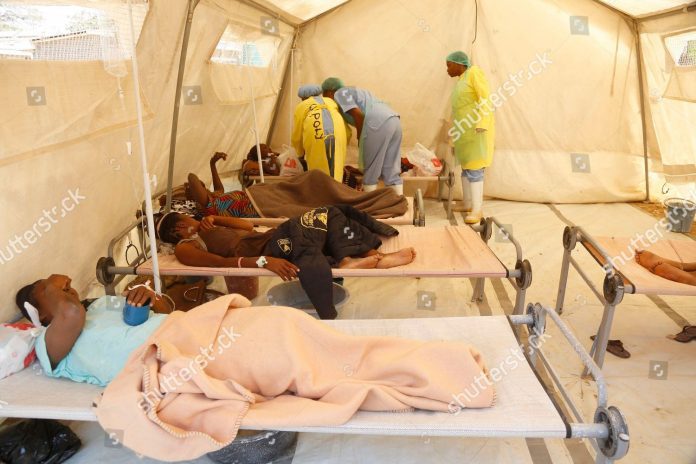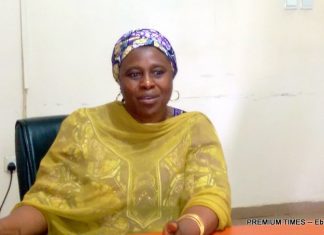
Most cholera-endemic states in Nigeria are experiencing a shortage of essential medicines, particularly infusion/drip.
This has had a negative impact on patient treatment, and as a result, the mortality rate from Cholera-related complications has increased.
Medical experts define infusion therapy as the administration of medication or fluids through a needle or catheter. It’s a method of administering medication that can’t be taken orally or needs to be administered at a specific rate.
The process of restoring lost water (dehydration) to the body tissues and fluids is the first priority in the treatment of cholera, according to medical experts, because the symptoms of cholera include regular stooling and vomiting. It’s done by injecting an infusion, or what’s known as a drip.
It should be remembered that cholera has been raging in some Nigerian states for the past few months.
Between January 1 and August 1, 2021, the Nigeria Centre for Disease Control (NCDC) reported 31,425 suspected cholera cases, 311 confirmed cases, and 816 deaths from 22 states and the Federal Capital Territory (FCT).
Benue, Delta, Zamfara, Gombe, Bayelsa, Kogi, Sokoto, Bauchi, Kano, Kaduna, Plateau, Kebbi, Cross River, Niger, Nasarawa, Jigawa, Yobe, Kwara, Enugu, Adamawa, Katsina, Borno, and FCT are among the states affected, according to the NCDC.
Our correspondent discovered that there is an insufficient supply of infusion in some hospitals in Nasarawa State and the Federal Capital Territory (FCT), resulting in a nearly 200 percent price increase.
Dr. Onuche Ijaja, Medical Director of NISSI, a popular private health facility in Masaka, Karu Local Government Area of Nasarawa State, responded to questions from our correspondent by saying that the Cholera situation is getting worse by the day.
He regretted, however, that the rising number of Cholera cases was exacerbated by a lack of the necessary drug-infusion for the disease’s treatment.
“I had three cholera patients receiving treatment in this facility as of yesterday evening,” he said. This is in addition to the patients we see on a daily basis. My attention was just drawn to the fact that there are two cases of the disease this morning. We don’t admit cholera patients on any given day in this hospital.”
The problem, according to Dr. Ijaja, was a lack of infusion/drip, which is commonly used to treat cholera.
“I contacted my friends from major pharmaceutical outlets in Nasarawa State and the FCT, but they said they didn’t have the medicine,” he said.
“I was rescued by a friend who also owned a hospital with just one carton of the product. However, I will have to pay a higher price.
“A friend gave me 10 cartons for 160,000 naira this morning. As a result, a carton now costs $16,000. But, before the scarcity sets in, we can get 64 cartons out of this 160,000. That is to say, each carton was sold to us for 2500 naira at the time.”
According to him, the situation is pathetic and out of reach for the average person.
“Those of us who practice in the communities are simply assisting people in their daily lives; we are not practicing to make money. Most of the time, you treat patients who are unable to pay. You won’t be able to keep them. Because of my conscience and the nature of our training, I am unable to keep any patients due to a lack of funds, and I am unable to turn my gaze away from a patient due to a lack of funds.
“I am pleased to report that since the cholera outbreak this year, I have never lost a patient to the disease. “This is enough for me.”
As a result, Dr. Ijaja has urged the relevant authorities to take action to address the recent scarcity of medicines and subsequent price hikes. This, he claimed, is in the best interests of the country’s common people.
In a different twist, some major pharmaceutical importers interviewed by our correspondent blamed the National Agency for Food and Drug Administration and Control (NAFDAC) for the country’s medicine shortages and price hikes.
According to a source, an Abuja-based major dealer in pharmaceutical products who requested anonymity in response to questions from our correspondent, NAFDAC’s policy on increasing tariffs on Good Manufacturing Practices (GMP) imposed on pharmaceutical importers is the primary cause of drug scarcity in the country.
However, he warned that if well-intentioned Nigerians do not put pressure on NAFDAC to change its policy, the shortage will worsen in the coming days.
However, the pharmaceutical importer recalled that the Pharmaceutical Society of Nigeria (PSN), Lagos State branch, would raise the alarm about an impending drug shortage in Nigeria every May, but that Nigerians did not understand what they were saying.
“One of the major challenges is that we are a dependent nation in everything,” he says. There isn’t enough of anything in Nigeria.
“The regulatory agency, NAFDAC, came up with a contentious policy. That policy is known as the Good Manufacturing Practices Act policy payment.
“NAFDAC increased its fees, charging importers/manufacturers of drugs $110,000 per shipment. This money is charged to them directly.
“This impacted drug importers and manufacturers in the country, and that is what is starting to show up in the form of drug scarcity.”
A renowned pharmacist in Nasarawa State echoed this sentiment, stating that unless something is done urgently, Nigerians will face a shortage of medicines in the coming days.
It will be recalled that the PSN Chairman, Lagos state chapter, Gbolagade Iyiola, claimed in a statement titled: Pharmacy not for sale, that: “It is also an irony that NAFDAC inspectors have been invading retail Pharmacy outlets under various guises of regulatory violations imposing fines on perceived offences.
Read Also: Cholera Outbreak: Kano Records 5,221 Cases,169 Deaths
“In some cases, the fines imposed arbitrarily are as high as N500,000. NAFDAC has also insisted on pressing importers of the drug to pay as much as N4.2 million per foreign manufacturer facility for GMP clearance, despite the fact that India, the world’s largest exporter of drugs, has banned pharmaceutical exports to Nigeria due to the unique challenge of COVID-19, which continues to ravage the country’s population.
“The NAFDAC management team, led by its Director-General, has rebuffed all attempts to engage in dialogue on this issue, which could jeopardize the availability of life-saving drugs for Nigerians.”
Our correspondents contacted the NAFDAC through its media consultant, but as of 5:38 p.m., when this story was rounded up, the agency had not responded.
Join Television Nigerian Whatsapp Now
Join Television Nigerian Facebook Now
Join Television Nigerian Twitter Now
Join Television Nigerian YouTUbe Now




